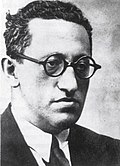| 1933 in the British Mandate of Palestine | |||||
| |||||
Events in the year 1933 in the British Mandate of Palestine.
| 1933 in the British Mandate of Palestine | |||||
| |||||
Events in the year 1933 in the British Mandate of Palestine.
| | This section needs expansion. You can help by expanding it. (August 2010) |
